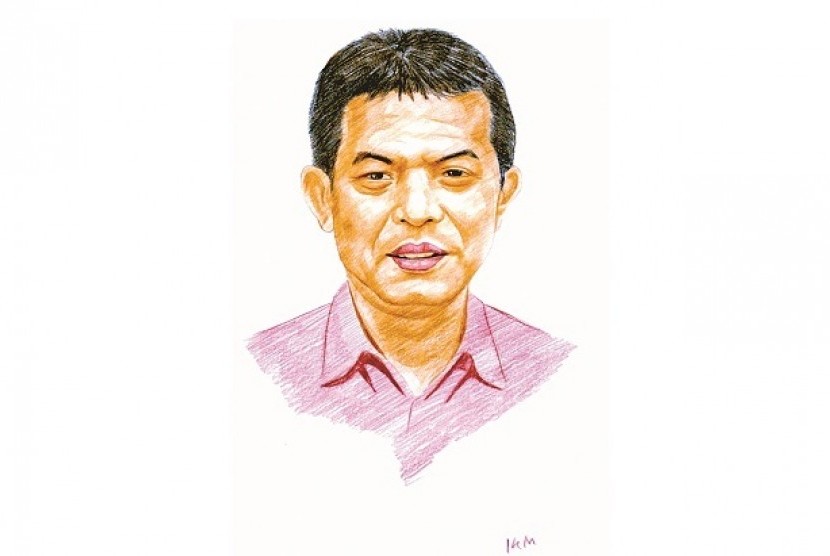REPUBLIKA.CO.ID, By: Ikhwanul Kiram Mashuri
I read the above title in an online version of Al Sharq Al Awsat, a London based Saudi Arabian newspaper published on October 5, 2013 edition. Reading the original article Al Fuqara Walimatun Li-asmak Indonesiya, my feelings were mixed, between shocked, sad, touched, and also curious. Idle question emerged, is there any fish in Indonesia as greedy as it has? Then, why should the poor? Aren't they skinny? Why it's not the rich with whom perhaps more delicious because they can eat nice meals and it's regularly anyway? So, how did the poor Arabs become a fine cuisine to Indonesia's fish?
Yes, this article was indeed discussed around the fate of the poor. Precisely, the poor Arab residents of the wealthy Middle East region. They are victims of civil war in Lebanon. They now inhabit a poor region in the south of the country, between Tripoli to the Syrian border. They are poor people in Egypt who were desperate to see their state improved. Several military coups and power struggles have led to economic collapse, rising unemployment and poverty.
They are poor victims of the U.S. invasion in Iraq and its allies. Also, they are victims of protracted intergroup, ethnic, and religious conflicts. Almost every day the poor people of Iraq haunted by suicide bomb attacks. They are poor people who are victims of conflict between Syrian regime President Bashar Assad with opposition. They are now living in refugee camps in Lebanon, Turkey, Jordan, Egypt, and Iraq. They are poor Syrian people who ran out of food daily that led local clerics to justify eating cats and dog's meat. They are poor people in Yemen, Tunisia, Morocco, Algeria, and other Arab countries.
In short, they are poor people who do not have hope of a better life in their own country. And, when desperation has reached its acute levels, they emigrated to other countries, especially to the developed countries. They hope to get a better life, even in other people's country and no matter what.
Ironically, according to Sawsan Al Abtah, a Lebanese female columnist who wrote the article, amid the distress of the poor Arabs, there are people or groups who want to take advantage of it. They created network of mafia that offers services to smuggle the poor overseas. And, the favorite destination is Australia. Of course, with a not so few dollar bills.
Various cases encountered by the Middle Eastern immigrants whose boat often sank in Indonesian were one of their mafia 'works'. The Mafia has an international network, including in Indonesia. The latest case is an immigrant's boat drowned in the waters of Cianjur, West Java, on September 27. 80 immigrants, the passengers, were on the boat. Its reported only 23 people survived. The rest were, dead or missing.
Sawsan Al Abtah illustrated the immigrants who died at sea as a fine cuisine of Indonesia's fish. However, she said, they might have been lucky to put an end to all the misery and hardship of their life. May Allah forgive all their sins (God yarhamhum). In the meantime, poor people, who still alive, have to endure prolonged and unbearable misery. They have nothing any more, including personal identity, except their body and life breath. In Indonesia, they are undesired. In the destination country, Australia denied their entry. In their countries of origin, they are often referred to as a traitor.
The sunken ship in Cianjur was, certainly, not the first or the last. As long as Arab countries still in conflict and fight each other, the wave of illegal immigrants from the Middle East will continue. But, more ironic, Al Abtah further said, their country of origin does not seem to matter the issue. The immigrant seems to have not considered as citizens any more. They are like 'in the middle of nowhere' citizens.
Even more distressing, Arab media were less interested in reporting the tragedy. If there was any news about them, it's only occasionally and only a small news. They seem to prefer to report the 'light' things that could be a pride. Meanwhile, immigrants are only considered to be the dark side of the nation.
The 'light' things, for example, could be seen of news about the mighty Burj Khalifa, the tallest manmade tower in the world. A tower that also serves as a hotel that stood firm in Dubai, United Arab Emirates. Alternatively, the news of elite football clubs in Europe, Manchester City and Paris St-Germain (PSG), which were owned by citizens of the United Arab Emirates. Manchester City is owned by Sheikh Mansour bin Zayed Al Nahyan and PSG financed by Sheikh Nasser Al Khelaifi.
Or, also news about Prince Al Walid bin Talal bin Abdul Aziz. A businessman who is also a nephew of King Abdullah bin Abdul Aziz who ever angry at Forbes magazine for not enlisting him on 10 richest people list in the world. He also plans to build Kingdom Tower in Jeddah that will beat Burj Khalifa height. Alternatively, the news of Formula 1 race event held at the Bahrain International Circuit or the news about anniversaries of the kings or rulers of Arab countries.
That's the dark side and the light side of the Arabs. It's splendor and misery. The misery which often actually created by grandeur and power struggles


